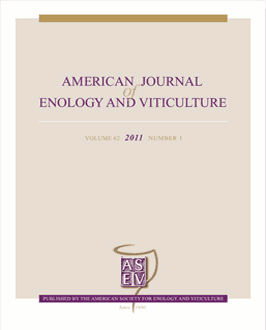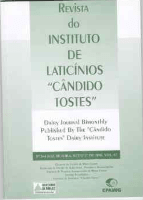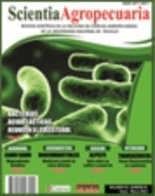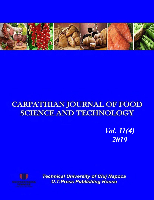
Ciencia e Tecnica Vitivinicola
Scope & Guideline
Innovating Horticulture: Where Research Meets Excellence
Introduction
Aims and Scopes
- Viticultural Practices and Innovations:
The journal explores various viticultural techniques, including the application of mycorrhizal fungi, rootstock selection, and the effects of environmental factors on grapevine performance. - Enological Research and Wine Quality:
Research on winemaking processes, including fermentation techniques, aging processes, and the impact of different maturation vessels on wine quality, is a core focus. - Sensory Analysis and Consumer Perception:
The journal emphasizes the importance of sensory evaluation in wine tasting and consumer preferences, offering insights into the methodologies for assessing wine quality and consumer behavior. - Market Dynamics and Economic Aspects:
Studies that investigate the economic aspects of the wine industry, including market failures, consumer behavior, and the economic impact of wine tourism, are regularly featured. - Sustainability and Environmental Impact:
Research on sustainable practices in viticulture, including the use of biostimulants, the impact of climate change, and environmental models applied to wineries, is increasingly prominent.
Trending and Emerging
- Sustainable Viticulture Practices:
There is an increasing emphasis on sustainability, with research exploring environmentally friendly practices, such as the use of biostimulants and the impact of climate change on viticulture. - Consumer Behavior and Wine Tourism:
Research focusing on consumer perceptions, preferences, and the overall experience of wine tourism is on the rise, indicating a growing interest in understanding market dynamics. - Advanced Analytical Techniques:
The application of sophisticated analytical methods, such as RT-PCR for virus detection and advanced spectroscopy techniques, is trending, reflecting a broader interest in precision viticulture. - Impact of Climate Change on Viticulture:
Studies examining the effects of climate variability on grape cultivation and wine quality are increasingly prominent, highlighting the importance of adaptive strategies in the face of climate challenges. - Functional and Health Benefits of Wine Components:
Emerging research on the health benefits of wine constituents, such as antioxidants from grape seeds, is gaining attention, aligning with current consumer trends towards health-conscious products.
Declining or Waning
- Traditional Pest Management Strategies:
Research focused on conventional pest management techniques, such as the use of chemical pesticides, has decreased, possibly due to a growing emphasis on integrated pest management and organic practices. - Basic Viticultural Techniques:
Themes surrounding traditional viticultural methods, such as simple irrigation techniques or standard pruning practices, have seen less attention as researchers increasingly explore innovative and sustainable alternatives. - Generalized Wine Chemistry:
While specific studies on wine chemistry remain relevant, there is a noticeable decline in broad, generalized studies; instead, there is a trend towards more specialized research focusing on particular compounds or interactions.
Similar Journals

SOUTH AFRICAN JOURNAL OF ENOLOGY AND VITICULTURE
Your Gateway to Cutting-edge Viticulture ResearchThe South African Journal of Enology and Viticulture, published by the South African Society of Enology and Viticulture (SASEV), stands as a pivotal platform for research in the fields of enology and viticulture. With an ISSN of 0253-939X and E-ISSN 2224-7904, this Open Access journal has been contributing significant scholarly work since 1980, ensuring accessibility to a broad audience of researchers, professionals, and students engaged in the viticulture and winemaking sectors. Based in Stellenbosch, South Africa, the journal has achieved commendable Q3 rankings in the fields of Food Science and Horticulture as of 2023, reflecting its growing influence in these areas. With a comprehensive converged publishing span from 2004 to 2024, the journal seeks to expand the frontiers of knowledge by publishing innovative research, reviews, and case studies that address current challenges and advancements in viticulture and enology. Researchers engaged in agricultural and biological sciences will find valuable insights, as highlighted by its Scopus ranks, particularly in horticulture (Rank #46/115) and food science (Rank #215/389), placing it in the th percentile of international academic standards.

AMERICAN JOURNAL OF ENOLOGY AND VITICULTURE
Innovating Practices in Grapevine Cultivation and Wine Production.The American Journal of Enology and Viticulture, published by the American Society of Enology and Viticulture, serves as a pivotal platform for scholarly research in the disciplines of enology and viticulture. With a distinguished ISSN of 0002-9254 and an E-ISSN of 1943-7749, this esteemed journal has been contributing significant insights since its inception in 1973. Currently residing in the prestigious Q2 category for both Food Science and Horticulture, it ranks impressively among its peers, standing at #27 out of 115 in the Horticulture sector and #165 out of 389 in Food Science, reflecting its impact and relevance in agricultural research. The journal offers a wealth of valuable research articles, reviews, and studies that explore the intricacies of grape cultivation and wine production, making it an indispensable resource for researchers, professionals, and students keen on advancing their knowledge in these fields. Although it does not currently operate under an open-access model, the rigorous peer-review process ensures that only high-quality, scientifically sound content is disseminated, promoting innovation and collaboration in the pursuit of excellence in viticulture and enology.

Applied Food Research
Fostering Sustainable Practices Through Research ExcellenceApplied Food Research, published by Elsevier, is an esteemed journal that plays a critical role in advancing the field of Food Science. With an ISSN of 2772-5022, the journal has established itself as a premier outlet for high-quality research, achieving a commendable Q1 ranking in the 2023 Food Science category and a 63rd percentile in Scopus rankings for Agricultural and Biological Sciences. Covering a diverse range of topics from food safety to innovative processing techniques, Applied Food Research seeks to publish pioneering studies that enhance our understanding of food systems and contribute to broader discussions on sustainability and nutrition. As it converges on its fourth year of publication, researchers, professionals, and students alike are encouraged to engage with its content through various open access options, ensuring widespread dissemination of knowledge in a field that is vital to global health and well-being. Operating out of Amsterdam, Netherlands, this journal is poised to be an indispensable resource for anyone dedicated to making significant contributions in the domain of food science.

JOURNAL OF FOOD SCIENCE AND TECHNOLOGY-MYSORE
Transforming Ideas into Food SolutionsJOURNAL OF FOOD SCIENCE AND TECHNOLOGY-MYSORE, published by SPRINGER INDIA, is a distinguished peer-reviewed journal that has been contributing to the ever-evolving field of food science since its inception in 1974. With an ISSN of 0022-1155 and E-ISSN 0975-8402, this journal holds a commendable position in the Q2 category for Food Science, as per the 2023 metrics, and ranks #58 out of 389 in Scopus's Agricultural and Biological Sciences sector, achieving an impressive 85th percentile. The journal publishes high-quality research articles, reviews, and case studies that cover a wide array of topics, from food preservation to innovative technologies in food processing. Although it is not an open-access journal, it endeavors to disseminate essential knowledge and research strategies that advance food science and benefit both industry professionals and academia. The geographical reach of the journal, alongside its rigorous editorial standards, solidifies its stature as a pivotal resource for researchers, professionals, and students dedicated to the enhancement of food science practices and technologies.

Agricultural and Food Economics
Uncovering the economic dynamics that shape our food future.Agricultural and Food Economics is a leading journal published by SPRINGERNATURE, dedicated to the advancement of research in the interconnected fields of agriculture, food systems, and economic analysis. Established in 2013 and operating under an Open Access model, this journal serves as a vital platform for scholars and practitioners to disseminate innovative findings and insights that influence policy and practice. With a notable impact reflected in its 2023 quartile rankings—Q1 in Agricultural and Biological Sciences (miscellaneous), Q2 in Economics and Econometrics, and Q1 in Food Science—this journal is recognized for its rigorous scholarly output. It ranks among the top resources in its domain, with Scopus ranks placing it in the 88th percentile for Agricultural and Biological Sciences and the 79th percentile for Economics. The journal covers a broad spectrum of topics, including sustainable agricultural practices, the dynamics of food markets, and the economic implications of food policies. Researchers, professionals, and students alike will find valuable insights and comprehensive analyses that contribute to the ever-evolving discourse on food and agriculture.

Journal of Candido Tostes Dairy Institute
Transforming Dairy Knowledge into Practical SolutionsJournal of Candido Tostes Dairy Institute, published by the prestigious INST LATICINIOS CANDIDO TOSTES, has established itself as a vital resource in the field of dairy science and technology. This Open Access journal, operating since 2008, provides an inclusive platform for researchers, professionals, and students to share groundbreaking findings and innovative practices related to dairy production, processing, and quality. Located in Brazil, this journal aims to advance knowledge and standards within the dairy industry, ensuring global access to high-quality, peer-reviewed research. The journal not only contributes to the scientific community but also supports practical advancements that benefit dairy producers and consumers globally. By fostering collaboration among scholars and practitioners, the Journal of Candido Tostes Dairy Institute plays a crucial role in shaping the future of dairy sciences. We encourage contributions that explore novel aspects of dairy research, thereby bridging theoretical insights with industry applications.

Scientia Agropecuaria
Bridging theory and practice in the world of agricultural sciences.Scientia Agropecuaria, an esteemed journal published by the Universidad Nacional de Trujillo’s Faculty of Agricultural Sciences, is dedicated to advancing research in the fields of Agronomy, Animal Science, and Soil Science. With a rich heritage since its inception, the journal has embraced Open Access since 2010, ensuring global dissemination of knowledge to researchers and practitioners. Hailing from Trujillo, Peru, it plays a vital role in the scientific community, capturing a Q3 ranking across multiple categories in the 2023 category quartiles, which reflects its growing influence, supported by its commendable Scopus percentile rankings. The scope of the journal is to publish original research, reviews, and insights that address critical issues and innovations in agriculture and related fields, making it a key resource for researchers, professionals, and students aiming to stay abreast of cutting-edge developments. As the journal continues its convergence until 2024, it remains an important platform for impactful contributions to the agricultural sciences.

Carpathian Journal of Food Science and Technology
Fostering a Global Dialogue on Contemporary Food IssuesCarpathian Journal of Food Science and Technology, a distinguished publication from the NORTH UNIV CENTER BAIA MARE, has been a pivotal platform for disseminating groundbreaking research in the field of food science since its inception in 2009. With an ISSN of 2066-6845 and an E-ISSN of 2344-5459, this Open Access journal aims to promote knowledge and innovation, offering unrestricted access to its content, thereby enhancing visibility for authors and facilitating a wider readership. Based in Romania, the journal plays a crucial role in advancing scientific inquiry within the agricultural and biological sciences, particularly focusing on contemporary food science issues. As it continues its convergence through 2024, the journal currently holds a Q4 ranking in the Food Science category, allowing it to carve out a unique niche within the academic community despite its current Scopus percentile ranking of 19th. Scholars, researchers, and students in the field will find the journal an invaluable resource for the latest advancements and discussions, making it an essential addition to their academic pursuits.

MITTEILUNGEN KLOSTERNEUBURG
Connecting Scholars for Sustainable GrowthMITTEILUNGEN KLOSTERNEUBURG is a prestigious journal published by the Höhere Bundeslehranstalt & Bundesamt für Wein- und Obstbau Klosterneuburg in Austria, focusing on the fields of horticulture and agricultural sciences. With an ISSN of 0007-5922, this journal disseminates vital research findings and advancements within the horticultural sector, emphasizing sustainable practices and innovative techniques in wine and fruit cultivation. It has been recognized for its scholarly contributions, achieving a Q3 ranking in horticulture as of 2023, positioning it among the notable resources in its field. While currently not offering open access options, MITTEILUNGEN KLOSTERNEUBURG remains an essential platform for researchers, professionals, and students alike, fostering knowledge exchange and collaborative advancements in horticultural science. The journal's dedication to supporting research from 1989 through 2024 highlights its longstanding commitment to excellence in the industry.

OENO One
Innovating Viticulture and Enology for a Sustainable Future.OENO One, published by the International Viticulture and Enology Society (IVES), stands as a leading open-access journal dedicated to advancing the science of viticulture and enology since its inception in 2015. Operating out of France, this innovative journal is pivotal in disseminating high-quality research that impacts the fields of Food Science and Horticulture, evidenced by its notable category quartiles—Q2 in Food Science and Q1 in Horticulture as of 2023. With Scopus rankings placing it in the 82nd percentile in Horticulture and the 62nd percentile in Food Science, OENO One delivers timely insights and robust findings to its readers, fostering collaboration and knowledge exchange among researchers, professionals, and students alike. The journal embraces a forward-thinking approach, featuring research from various aspects of wine production, quality assessment, and viticultural practices, making it an essential resource for anyone involved in these disciplines.